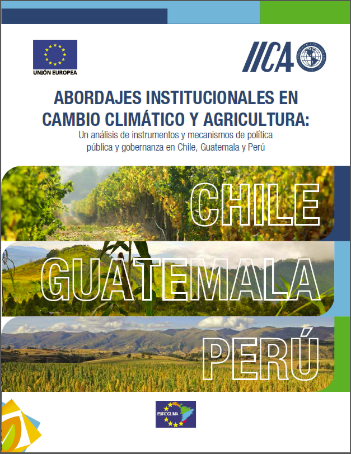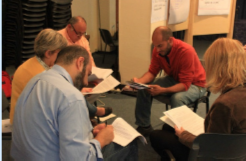Given the important role of agriculture under the Paris Agreement and in achieving the Sustainable Development Goals, IICA has been working to support a more active and informed participation of the sector in planning and action to address climate change.
Climate negotiators just met for two weeks in Bonn, Germany to advance the definition of the “rulebook” or the guidelines for implementation of the Paris Agreement. It is critical that the perspectives of the sector are taken into consideration to effectively channel the necessary levels of investment in agriculture to facilitate its contribution to adaptation and mitigation in a manner that does not compromise food security. Given the important role of agriculture both, in meeting the commitments made under the Paris Agreement, and in achieving the Sustainable Development Goals, IICA has been working to support a more active and informed participation of the sector in planning and action to address climate change.

New Publication: As part of this effort, case studies were elaborated to provide insight into how agriculture and climate change are addressed by the public institutions, plans and strategies of three Latin American countries: Chile, Guatemala and Peru. The publication is entitled Institutional Approaches to Climate Change and Agriculture: An analysis of public policy instruments and governance in Chile, Guatemala and Peru and can be found (in Spanish) at: https://goo.gl/4TdmDM
The study was carried out with the close collaboration and endorsement of officials and specialists from the agriculture, environment, economic and planning sectors of each participating country. This inter-sectoral participatory methodology included a compilation and critical analysis of available information during a workshop held in each country. Daniela Medina, lead author, expressed that, “The process of bringing together actors from different institutions to examine how climate change is being addressed in the agriculture sector was valuable as it underscored to all involved the importance – and challenge – of coordinating planning and integrating actions across sectors.”
This initiative was supported by the EUROCLIMA-IICA project financed by the European Commission.

Facilitation of national level processes: Together with GIZ, IICA initiated a process at the end of 2016 to train technical professionals from Chile, Argentina and Paraguay on how to integrate climate change adaptation into agricultural sector development planning. Each country team determined how they would then apply the knowledge given their national context.
In Argentina, IICA has joined forces with INTA to design and pilot climate proofing guidelines that can later be institutionalized into project development and implementation processes at INTA. In Chile, IICA, together with INDAP and the INIA, is leading a process to develop capacities for the development of resilient agriculture systems in the Araucanía region. Those professionals are now conducting participatory vulnerability analyses with producers to identify the climate risks and potential adaptation measures. These measures will then be piloted on various farms to test their effectiveness. In Paraguay, IICA, in collaboration with the Ministry of Agriculture and Livestock, is working to develop capacities to integrate climate change into planning at different levels. This started with a national workshop and will continue with a local level workshop in a few months.
South-south exchanges: IICA provides different platforms for dialogue and exchange at both the international and national levels between different institutions, sectors and actors. IICA and its partners will be holding two workshops in May – one in Central America and another in South America – to facilitate learning and provide a space for the exchange of best practices amongst those responsible for developing and implementing public policy instruments to address climate change in the agriculture sector. Through a joint analysis of the current situation of the national plans, representatives from the agriculture, environment and planning sectors will identify lessons learned and challenges for each step in the process and explore the links between the sectoral instruments and the broader climate change strategies, including the Nationally Determined Contributions (NDCs).
For more information: kelly.witkowski@iica.int
*The opinions expressed in this newsletter are those of the authors and they do not reflect the position of the Institute on the topics presented.
*This post appears in the IICA Delegation in the USA Newsletter – March – April 2017











